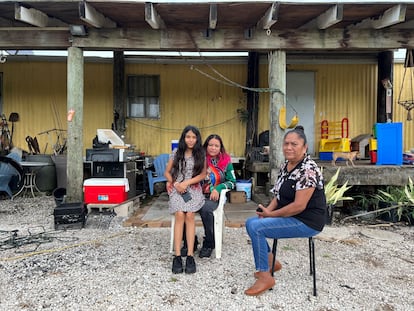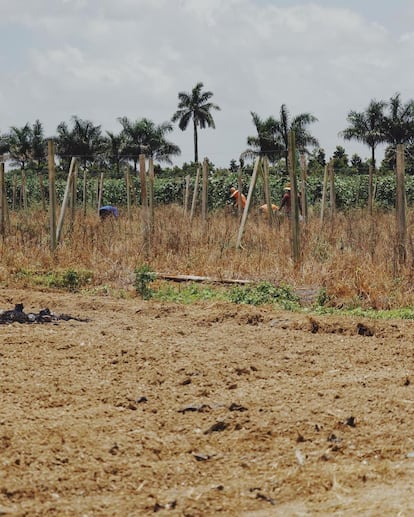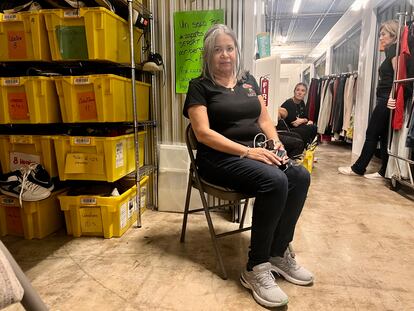Who will pick the fruit now? Ron DeSantis’ anti-immigration lab is up and running in Florida
A new heavy-handed law against immigrants — approved by the governor, who is running in the Republican Party’s presidential primaries — is causing an exodus of undocumented immigrants from agricultural areas. This is also creating labor shortages in other crucial sectors, such as tourism and construction


It’s two in the afternoon in the farm fields of Homestead, a South Florida city that’s filled with orchards. The thermometer shows a temperature of 93 degrees, and four undocumented seasonal workers have been planting beans since dawn. One of them says that his name is Wilmer. The 28-year-old recounts that he and the other members of his crew came “walking” from Guatemala, “through the Arizona desert.” They live as nomads, he explains, moving “from one state to another,” at the mercy of the planting season.
These days, one sees few workers in the fields of this agricultural area, which is at the western edges of the extraordinary Everglades wetlands. This transit area to the southern keys of Florida has never been so empty — and it’s not because of the extreme heat. Rather, it’s because of a new law passed by Ron DeSantis, the governor of the state. Along with his curtailing of abortion rights, his persecution of trans people and his war against the so-called “woke” agenda, DeSantis has turned his tough stance against immigration into a cover letter, in an attempt to secure the Republican Party’s 2024 presidential nomination. If he makes it to the White House, he has promised to secure the border, finish the wall with Mexico and stop “the invasion.” He plans to decree a “national emergency,” militarize the hottest points of the border and put an end to what he calls the “asylum fallacy.”
DeSantis has turned Florida — a state with about 772,000 undocumented immigrants (out of between 10.5 and 12 million nationwide), according to the Migration Policy Institute — into a kind of anti-immigration laboratory. Among other things, SB-1718 revokes driver’s licenses from undocumented individuals — a big hindrance in a part of the country where public transportation is poor and people have to drive long distances to get anywhere. The law also compels Florida hospitals that accept Medicaid to inquire about the legal status of patients before providing assistance and makes transporting immigrants a crime punishable by up to 15 years in jail, while requiring employers with more than 25 workers to use an application to certify the legal status of their employees. DeSantis has also allocated $12 million to expel those who arrive in Florida without documentation and send them to other more permissive jurisdictions, which are commonly known as “sanctuary states.”
“The effect was seen immediately. From one day to the next, we noticed the exodus to other places,” explains Benjamín Pérez, a Puerto Rican evangelical pastor and community leader. Pérez, who defines himself as a “conservative,” traveled to Washington and Tallahassee (the capital of Florida) while the law was being processed, in an attempt to make legislators understand that “a food crisis is a national crisis.”
“Who will pick the fruit now?” he wonders. “The fields of tomatoes, mangoes, passion fruit… There will be no one to work them.”

A walk through the center of this city — about 30 miles from Miami, with a growing population of 90,000 — shows the heavy impact of the law. At the local barbershop, appointments have plummeted. The travel agency did well at first, when they sold many bus tickets to those who were leaving the state, but for the past week, there hasn’t been “a single client.” And, at La Michoacana — an ice cream parlor and social gathering place — “things haven’t been the same for a month,” sighs Saúl Ávila, the manager.
Pérez repeats the same message over and over again, with the request that it be disseminated: “The day that [SB-]1718 came into force, we met with the police chief and other local authorities; they told us that they’re [not going to be going around] asking for papers. So don’t be afraid, don’t stop going to the hospital or reporting a hit-and-run to the officers for fear of being arrested. The raids on immigrants are not their thing, that’s what ICE [U.S. Immigration and Customs Enforcement] does… [The police departments] can’t keep up.”
The fear of being arrested
Despite what Pérez is saying, many find it hard to believe. “People feel panic,” explains farmer and activist Antonia Catalán, on her property in Redland, Florida, where her daughter, Gabriela Ibarra, and her son-in-law have a plant nursery (the most common business in the area), where they supply gardening companies and large stores throughout the country. Catalán is a support point for undocumented migrants, who come to see her from miles around. A Mexican who arrived at the time of Ronald Reagan’s immigration reform in the 1980s with her nine-month-old daughter, she’s not intimidated by the new law. She gives immigrants a ride in her car if they need a lift, or accompanies them to the hospital if they require medical attention.
To show that fear has settled in the community, she makes two hands-free phone calls. The first is answered by an older man, who owns an agricultural company that has lost most of its employees in recent weeks, after they fled to other states. “Now, there are only eight of us. If things don’t change, I’ll have to close forever in August,” the man laments, before asking that his name not be published. The second call is picked up by an undocumented woman who has a 12-year-old son who suffers from a chronic heart ailment. A few days ago, she went to a hospital in Miami and was asked for her son’s papers. While he was born in the United States, she lost his papers when her wallet was stolen. She doesn’t dare request them again, for fear of the consequences.
Sitting next to her mother — whom she refers to as “Mrs. Antonia” — Gabriela Ibarra notes that the law “has unleashed enormous racism against people like us; now, they look at us badly, wondering if we’re undocumented immigrants, as if we’re going to get them in trouble.” Ibarra is also involved in activism, particular in initiatives such as Qué Calor! [How hot!], which seeks to pass a state law that obliges employers to give farm workers “water, shade and rest.” She often drags her two daughters to protests. The younger girl, 12-year-old Kathy Camacho, is saddened these days, as she has lost several friends from her school. Their parents left Florida following the passage of the new law.
Samuel Vílchez Santiago, state director of the American Business Immigration Coalition, says that 47% of agricultural jobs in Florida are performed by undocumented workers, the sector most affected by the new legislation. And the new law is already influencing “tourism and construction.” These are industries that in places like downtown Miami, which are full of construction cranes, are experiencing a real boom. “[In Florida], we have one of the lowest unemployment rates (2.6%) in decades; out of every 100 jobs available, only 63 find an applicant. This law won’t help to improve that, but will aggravate other problems, such as inflation — Florida has the highest in the country — or the housing crisis.”

The consequences of the labor shortage are unpredictable, according to Andrew Selee, president of the nonpartisan D.C.-based Migration Policy Institute. “Contrary to other states, which are going out of their way to attract workers, it seems that Florida prefers to scare them. A reform like [the one passed by DeSantis] should be accompanied by a reinforcement of the H2-A visa system (which allows farm workers temporary entry into the U.S. for a few months each year, before they return to their countries of origin). But I fear that this is more of a political decision. These [laws] usually have a symbolic dimension, but in this case, the economic implications cannot be ignored. It seems to me that [the law is making a kind of] calculation; it wants to send a message to the electorate across the entire country. I suppose it will be popular with some of his Florida voters, but I don’t think it will be popular with businessmen, who are already suffering from a lack of labor,” Selee says.
The Hispanic reaction
There is no certainty about how the measure has affected the DeSantis campaign heading into the Republican presidential primaries. At the moment, he’s not doing so well — Trump is leading him by more than 30 points. Political analysts cite some of the Florida governor’s extremist policies on issues such as abortion or education to explain why his image isn’t improving in the polls. However, in the midterm elections last November, DeSantis handily won his re-election, garning 58% of the Hispanic vote. And this was after he had already taken many anti-immigrant decisions, such as using public money to send a plane full of Venezuelan migrants from Texas to the Democratic stronghold of Martha’s Vineyard, in Massachusetts, as a form of protest against the Biden administration’s border policy.
The recent immigration reform won’t break Colombian Carolina Castillo’s support for DeSantis. She was a Democrat for 28 years, until this past May, when she became perhaps the most famous Republican convert in Florida. This past week, she explained why she believes the governor has had no choice but to pass this law, “considering the historic catastrophe created by Biden at the border, with millions of people entering illegally, not to mention drugs and terrorists.” “He had to prevent [Florida] from becoming New York, San Francisco or Philadelphia, cities infested with crime,” Castillo opines. She attributes the exodus of immigrants following the passage of the law to the actions of “socialist organization — such as the Florida Immigrant Coalition — [which] are scaring them to leave. It’s like sabotage.” She argues that the new regulations “aren’t designed for those who have been settled in Florida for years, but those who have recently arrived.”

Patricia Andrade — who, back in 2016, founded Raíces Venezolanas [Venezuelan Roots], an organization that assists her recently-arrived compatriots who are seeking asylum — explains that she understands that DeSantis wants to make sure that “Florida doesn’t become Texas.”
“I hope that the reform will at least serve to stop the companies that were engaged in hiring [undocumented migrants] and paid them in cash to do inhumane jobs,” she explained last Friday, in the corridors of a storage room rental company in the city of Doral — better known as Doralzuela, given the growing population of Venezuelans. There are already 545,000 settled throughout the state.
Andrade, who says that she has visited almost all the critical points along the border with Mexico, has rented 10 spaces in this business, which are carefully organized into separate categories: children’s clothes in one, toys in another, crockery or jewellery a little further away. Migrants can spend Fridays picking up what they need to start their new life for free, while they wait for the 150 days to pass to obtain a work permit. This is the first of the crucial deadlines after a document is granted that allows them to stay in the country. Said document also summons them to appear before an immigration judge. Appointments are sometimes years away.
Juan Carlos Calderón — associate pastor at the Centro de Esperanza in Hallandale Beach — was one of more than 1,000 evangelical pastors who signed a letter last month asking the governor not to approve SB-1718. He considers himself to be a conservative, but he’s very critical of the new law. He believes that it will cause fear and racism. “One doesn’t solve a national problem with a state law that [creates an imbalance in] the distribution of immigrants throughout the country,” he affirms. “We asked [the governor] to introduce at least some exception to allow us to work with the undocumented. Imagine if we had to ask parishioners for identification to give them mass. Or if we cannot attend to a recently-arrived immigrant after a terrible journey. Mercy has to be above the law. Where is God’s love?”
Sign up for our weekly newsletter to get more English-language news coverage from EL PAÍS USA Edition
Tu suscripción se está usando en otro dispositivo
¿Quieres añadir otro usuario a tu suscripción?
Si continúas leyendo en este dispositivo, no se podrá leer en el otro.
FlechaTu suscripción se está usando en otro dispositivo y solo puedes acceder a EL PAÍS desde un dispositivo a la vez.
Si quieres compartir tu cuenta, cambia tu suscripción a la modalidad Premium, así podrás añadir otro usuario. Cada uno accederá con su propia cuenta de email, lo que os permitirá personalizar vuestra experiencia en EL PAÍS.
¿Tienes una suscripción de empresa? Accede aquí para contratar más cuentas.
En el caso de no saber quién está usando tu cuenta, te recomendamos cambiar tu contraseña aquí.
Si decides continuar compartiendo tu cuenta, este mensaje se mostrará en tu dispositivo y en el de la otra persona que está usando tu cuenta de forma indefinida, afectando a tu experiencia de lectura. Puedes consultar aquí los términos y condiciones de la suscripción digital.








































